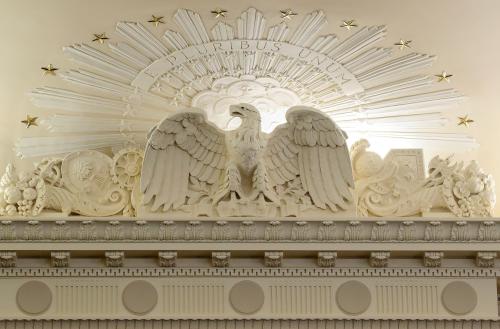The argument that President Trump cannot be convicted on either of the House’s impeachment counts because neither count states a crime has assumed an increasingly important role during the Senate trial. Leaks from former National Security Adviser John Bolton’s book and the pressure some Senate Republicans now feel to allow Bolton, and perhaps other witnesses, to be called has raised the stakes on this conversation over the past few days. This claim, which erstwhile law professor and celebrity lawyer Alan Dershowitz was charged with advancing, gives an out to Republican senators who might otherwise feel politically compelled to support the House Managers’ call for witnesses. Their justification for resisting the call can be: since the House’s impeachment counts are fatally defective for want of a charged crime, witnesses need not be called because even if witness testimony would prove that Trump behaved as alleged with respect to Ukraine, he has done nothing he can be impeached for.
On Monday, Professor Dershowitz, appearing for the Trump team, argued that with one narrow exception (discussed below) the requirement that only a charged crime can be grounds for impeachment is implicit in Constitution’s impeachment clause which states that, “The President…shall be removed from office on impeachment for, and conviction of, Treason, Bribery or other high Crimes and Misdemeanors.” He acknowledges that his view is a minority viewpoint among scholars who have written on the issue, but he sees support for his interpretation of the impeachment clause in material written by Blackstone, the eminent English jurisprude, which speaks of misdemeanors as crimes. Blackstone, however, was writing decades before the Constitution was drafted, and we have far better evidence of the Framers’ intent and of how, since the dawn of this nation, that intent has been interpreted. Dershowitz also finds support for his position in the Framers’ decision not to include maladministration as a reason for impeachment and in arguments that former Supreme Court Justice Benjamin Curtis made in his defense of Andrew Johnson. Indeed, Dershowitz indicated in at least one television appearance that reading the Curtis defense led him to change his prior views on the matter.
Although Dershowitz acknowledges that his view puts him in a small scholarly minority, he never explains why the minority is so small. A look at the evidence favoring the general consensus, as well as a critical analysis of the arguments Dershowitz advances, makes clear why it is not unfair to say that Dershowitz’s views “stink of the lamp” (lawyer-speak for attempts by lawyers to “construct, out of their imaginations, rationales to support the otherwise absurd claims they intended to make,” supposedly done late at night by the light of a smelly oil lamp. )
A good portion of Dershowitz’s claim is based on what he sees as the cogency of the argument that Curtis advanced in Johnson’s impeachment trial. Curtis argued that a president can only be impeached if he has committed a crime. This argument, Dershowitz suggests—and I have no reason to think he is wrong—may have been what persuaded some Senators to acquit Johnson when the final votes were taken. However, the legal question at issue today is not whether Curtis made a cogent argument or one that swayed a few votes. Rather it is what the Framers intended the impeachment clause to mean. To the extent that the Andrew Johnson trial has precedential value on the meaning of the clause, that precedent lies in what it tells about what a group of senators, only few generations removed from the Framers, thought the clause meant. Not every senator who voted to acquit Johnson need to have voted that way because he accepted Curtis’s argument, but everyone who voted to convict would have had to reject that argument if their votes were cast in good faith. Thirty-five of fifty-four senators voted to convict, a rejection of Curtis’s argument by almost two-thirds of those who heard it.
There is also evidence closer in time to the drafting of the Constitution which indicates that behavior supporting articles of impeachment—i.e., “high crimes and misdemeanors”—need not be crimes. In Federalist 65, Alexander Hamilton famously wrote that the subjects of the Senate’s impeachment jurisdiction “are those offenses which proceed from the misconduct of public men, or, in other words, from the abuse or violation of some public trust.” Dershowitz tries to explain this language away, but fails to provide on-point support for his allegation that to attribute to these words their natural meaning is to misread Hamilton’s intent. This is most likely because despite his intensive study of the history of impeachment, he can’t find any.
If Hamilton’s language is not enough to make the case that impeachment does not require that a legal crime be charged, other early evidence makes this clear. In 1803 Judge John Pickering became the first American to be impeached, convicted and removed from office. The main charge against him was that he was “a man of loose morals and intemperate habits,” who on at least one occasion was drunk on the bench. The objection that a legal crime was a necessary precondition to impeachment was explicitly made a year later in the impeachment trial of Judge Samuel Chase. Although Chase was acquitted, on three counts not involving crimes a majority voted to impeach. The majority would not have existed had most senators from the founding generation believed a criminal violation was necessary to convict. Perhaps the most authoritative statement of what the Framers intended is found in the constitutional commentaries of Justice Story. Story was appointed to the Supreme Court in 1812, and in 1833 published the first edition of what became the 19th century’s most influential work on constitutional interpretation. In it he wrote, “our fathers adopted a Constitution under which official malfeasance and nonfeasance and, in some cases, misfeasance, may be the subject of impeachment, although not made criminal by act of Congress, or so recognized by the common law of England, or of any State of the Union.” Professor Dershowitz’s does not note these sources, much less explain them away.
In addition to Blackstone and Curtis, Dershowitz finds support for his position in the Constitution’s drafters’ decision to reject “maladministration,” as a ground for impeachment. Dershowitz is right; maladministration is not an impeachable offense. His mistake is to equate “maladministration,” with “abuse of power,” which can be grounds for impeachment. George Bush’s role in the botched response to Hurricane Katrina, including especially his appointment of and support for a FEMA head who was not up to the task, was arguably maladministration. He cannot be impeached for this. Had Bush, however, refused to provide New Orleans with recovery funds allocated for that purpose by the Congress because the New Orleans mayor would not support his re-election, that would have been an abuse of power, and impeachment would have been justified.
Like a good lawyer, Dershowitz attempts to buttress his legal analysis with policy arguments. He argues that if “abuse of power” is an accepted reason for impeachment, there is hardly a president who at some point during his term would not be vulnerable to impeachment. This argument cannot be dismissed out of hand, for the concern is legitimate. But it is also far from dispositive. Protections against the routine impeachment of presidents are both political and structural. Politically, unless a charged abuse of power is seen as so serious as to merit House action and a Senate trial, the effort is likely to backfire, as it arguably did when President Clinton was impeached for what Dershowitz at the time argued was not a high crime. Structurally, the requirement that two-thirds of the Senate must find a president guilty to remove him from office also protects against abuse. In addition, the requirement that the abuse charged be of a “high” nature enunciates a political norm that, if honored, limits what is regarded as impeachable. We can see how these factors played out following the Democrats’ success in the mid-term House elections. If all that was needed to justify impeaching a president was an abuse of power, President Trump gave the House numerous reasons to impeach him. He separated children from their parents and put them in cages; he did everything he could to undercut the viability of the ACA, and he appears to have subverted treaty obligations with respect to asylum seekers. Some House Democrats would have impeached Trump for these or other reasons, but the House, despite being controlled by Democrats, did not move to impeach. It took an even more serious abuse of power, one which, if the facts are as alleged, struck at the heart of our constitutional system, before the House was willing to proceed.
Dershowitz also seeks to bolster his position by arguing that we can never be sure of the reasons a president acted as he did, and that, “a subjective probing of motives cannot be the legal basis for a serious accusation of abuse of power…”. This objection is easily met. Motives matter greatly in the law. They distinguish capital homicide from legal self-defense. The law probes motives all the time, subjectively evaluating the evidence that bears on them. If jurors can send a man to his death because of how they judge his motives, surely the conviction and impeachment of a president can rest on similar judgments. What is key is not that motive is being assessed, but that there is enough evidence to convince a reasonable juror or senator that motive is being assessed correctly. This is one reason why jury trials have witnesses and impeachment trials may need them.
An implication of the argument that charged crimes are needed for impeachment exposes its untenability. Suppose that on his first day in office the president, acting in his capacity as Commander-in-Chief, ordered the military to employ only Methodists as chaplains and to discharge any chaplains who were not Methodists. This would break no law and is far removed from the crimes of treason and bribery. Is it plausible to believe that the Framers, who when they passed the First Amendment legislating against the establishment of religion, meant that the nation’s only remedy against a president who contravened the amendment was to wait four years and elect a new president? Indeed, no law makes it a crime for the president to ignore a Supreme Court ruling. Would the Framers, who if they agreed on anything about the presidency, agreed that the president was not a king, have written a document that required the nation to wait four years before removing from office a president who acted like a king? The question is rhetorical, for the answer seems obvious. It is not the answer Professor Dershowitz gives.
Finally, there is a nuance to Dershowitz’s argument that I have not yet acknowledged. He does not rigidly hold that impeachment must be based on acts that could lead to criminal convictions. For him, it is enough that the charged conduct be “akin to treason and bribery.” Many Democrats have argued that President Trump’s alleged attempt to withhold allocated funds from Ukraine until its president announced an investigation of the Bidens has much in common with both giving and soliciting bribes. So, at the end of the day, it is at least arguable that the fruits of Dershowitz’s research support the legal sufficiency of the House’s first article of impeachment. Dershowitz might have pointed this out, but didn’t.








Commentary
Does impeachment require criminal behavior? In a word, “No”
January 29, 2020